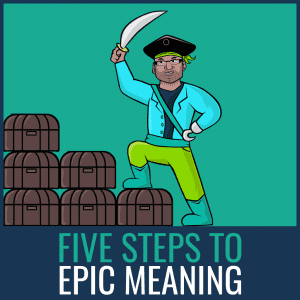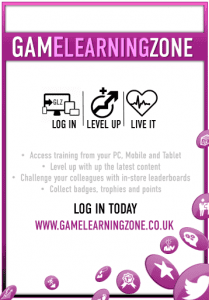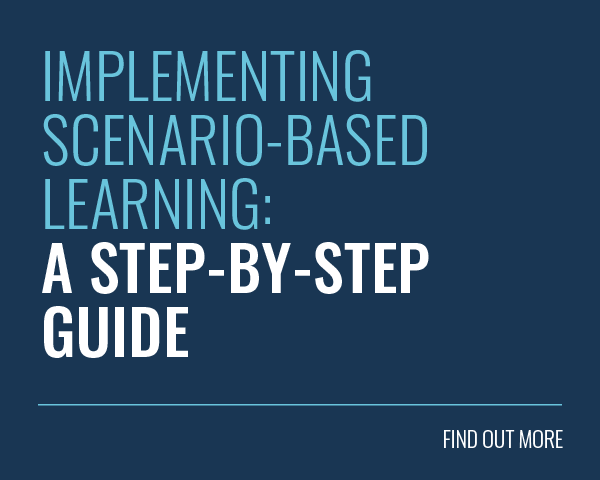 Last week we took a good look at the concept of Epic Meaning. It all boils down to the desire to do something that matters, to be involved with a goal, to be of service, to be a hero.
Last week we took a good look at the concept of Epic Meaning. It all boils down to the desire to do something that matters, to be involved with a goal, to be of service, to be a hero.
Just looking at that, it’s obvious how much of a help this could be for engaging learners. After all, if someone believes that putting more effort into their training will transform them into a hero, then you can be sure that they’re going to give it everything they’ve got!
That’s why we’ve put together this handy step-by-step guide, to help you deliver Epic Meaning to your learners, and make your training programme much more effective.
Step 1 – Design your narrative
One of the best ways to generate Epic Meaning is by wrapping your training around a theme or narrative. This theme should be something that your learners can relate to.
For instance, here at Growth Engineering, we focus all of our efforts on the battle against dull online learning. Our Academy Superheroes platform is used to train our customers on how to use our Academy LMS, so we themed it around the war against dull online learning.
We even created a character called Dr Dull, and gave him his very own profile on the platform! He drops by to leave comments every now and then, helping to immerse our customers in the narrative, and encouraging them to carry on learning.
Step 2 – Run a teaser campaign

Generating some buzz and excitement around your training programme is the perfect way to engage your learners. A teaser campaign is a brilliant technique which can give your project a roaring start!
Let your learners know that something big is on the way. You might use your company’s internal communications, or put up posters around the office. The trick is to make sure you don’t reveal too much, leaving that curiosity gap which your learners will be desperate to discover.
As everyone starts noticing the teasers, the hype will build and word will spread like wildfire. When you finally reach the big reveal, all of the preceding excitement will make it a truly momentous occasion for your learners!
Step 3 – Use gamification
Think back to our definition of Epic Meaning. It’s about the desire to be involved with a goal and to be a hero. Gamification is a great way to deliver these feelings to your learners.
First of all, earning badges is a clear indication of progress. A learner can see which badges they haven’t earned yet, and set themselves a goal to collect them all. Every time they earn a badge, they’ll experience a mini victory, and know that they’re one step closer to their goal!
Also, recall how a good narrative can deliver Epic Meaning. By using level structures, you can advance the narrative as learners progress. So when a learner levels up, they’ll unlock the next stage of the story, making them feel as though they’ve really achieved something.
Step 4 – Use social learning
 If you’re going to find success on an epic scale, you need friends. Frodo has the Fellowship, Harry Potter has Ron and Hermione, and Postman Pat has Jess the cat. And rightly so, because how can anything be epic if you aren’t able to share it with anyone?
If you’re going to find success on an epic scale, you need friends. Frodo has the Fellowship, Harry Potter has Ron and Hermione, and Postman Pat has Jess the cat. And rightly so, because how can anything be epic if you aren’t able to share it with anyone?
To see how social functionality helps with Epic Meaning, you need only look at a few Massively Multiplayer Online games, or MMOs. The most well-known example is World of Warcraft, and a big feature of this game is raiding. The most epic raids are impossible to complete on your own, so players have to team up into large clans and work together to defeat extremely powerful opponents.
If you allow your learners to interact with each other then you’ll find a learning community starts to form. As they’re able to share ideas, they’ll start to realise that they’re all working together towards a common goal, and their sense of Epic Meaning will rise!
Step 5 – Use personalised learning
Personalised learning is all about delivering the right training to the right people at the right time. We all have different wants and needs when it comes to learning, so tailoring the experience can be extremely effective.
But it’s also a fantastic way to build more Epic Meaning! If your training can speak directly to the learner in their own context, it will help engage them and make them feel like the Chosen One.
When training is placed into a personal context, it’s much easier to understand exactly how it will help you improve and become the hero you’ve always wanted to be!








